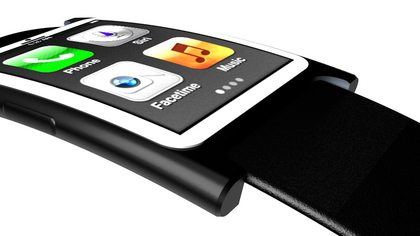
Unless you've somehow created a technological void or have stumbled upon this site through some kind of clicking frenzy, you'll know it's been a fascinating few years for portable technology.
There's an extremely high likelihood you could be reading this on a smartphone or tablet right now and as these all-in-one devices fulfill the gadget gaps in our day-to-day lives considerably well, you'd never have thought there would be a need to be any more personally connected than you already are.
Samsung already confirmed
If the rumours are to be believed then almost every major technology brand out there thinks this clearly isn't the case. Samsung - who shipped more smartphones than anyone else in the UK last year - have already confirmed they're working on a smart watch.
Of course, any modern-day rumour mill wouldn't be complete without a nod to Apple, who have filed a variety of patents that lend to the credence of a possible 'iWatch' arriving at some point later this year, if not sooner.

Lesser known brands have also taken the wearable market by storm such as Pebble with their smartwatch. Though not so independently intelligent as Google Glass or even Sony's smartwatch, Pebble was clearly seen by the 85,000 or so Kickstarter backers as something more plausible as an accessible entry in to the world of wearable tech.
Without a tether to a compatible Android or iOS device, the Pebble on its own isn't actually particularly smart - its capabilities are reduced to telling the time in a variety of fashions.
With Bluetooth connection to a smartphone though, the Pebble comes alive with a feed of notifications as well as returning intents to the smartphone of choice – such as control over music and many other possibilities - that no doubt developers will realise the full potential of once Pebble makes its way in to the hands of the masses, (many of the Kickstarter supporters are still waiting for their own to arrive).

Google have already laid out their future wearables quite clearly with Google Glass. Though the project has split opinions on whether people actually want to wander around with a prop straight out of Star Trek on their face, the technology is incredibly alluring and enough to make us think we're truly living in the visions of the future laid out for us in films and TV sci-fi series for many decades.
Google in the lead
Google, however, are pretty much on their own when it comes to so-called smartglasses, other than the utterly uninspiring competitor product being touted by Vuzix. It's clear that even manufacturers are not sold on the idea that wearable tech could be so brazenly obvious and literally in your face.
A large portion of the group that Google has chosen for their #IfIHadGlass 'competition' are mostly part of the elite, celebrities, high-profile technology journos and ultra-cool extreme sports types that will no doubt have been hand-picked for their circle of influence.
Google is hoping that these folk can convince the average person that wearing $1,500 of advanced technology on their head is the way forward, but it's more likely that over the next couple of years it will just be considered the top-end in wearable possibilities and likely something that most people just aren't ready for.

A smart watch, on the other hand (or wrist), costing a fraction of the current price-tag of Google Glass is much more appealing to the general public.
They could have a trendy wrist adornment supplying them with all the important stuff they need to be aware of without causing the social faux-pas of getting out their smartphone at the most inopportune moment.
Conversely, believing that colleagues, partners or bosses would be comfortable with us having a constant stream of distractions fed to our retinas in the form of some kind of headwear still seems a little far-fetched.
With the additional accessory of a high-resolution camera, the smartglasses become not only a potential privacy debate for tabloids to faun over but also something that will likely be banned in a variety of locations or institutions.
Smartwatches will be first to mass-market
So for now, smartwatch it is. The Apple iWatch, iWrist, iTime or whatever iNalogy they decide to call it will of course be incredibly popular.
It isn't going to be the cheapest of the wearables by a long way but Apple's intentions with the previous generation iPod Nano and wrist-strap accessories showed a glimpse in the direction Apple is likely to go.
It's difficult to see them making it as just an accessory to a smartphone akin to the Pebble, because as with every other portable device they've ever produced, it has to stand up on its own if it's going to be the consumer's device of choice for pouring money in to Apple's lap; indeed it could even be marketed as the 'Next iPhone'.
It goes without saying that Samsung will introduce something similar, likely at a cheaper price point than Apple, and many other brands such as LG will jump on the wagon right behind them.
If this year isn't, then 2014 will be the year of the smartwatch, when being concerned with details such as the time and date will be a minor function of whichever brand you choose.
You'll be wondering what you ever did without one and we can only hope that being head-down and glued to your smartphone will be replaced by scores of us checking our watches repetitively as if time had suddenly gained a whole new level of importance.




No comments:
Post a Comment